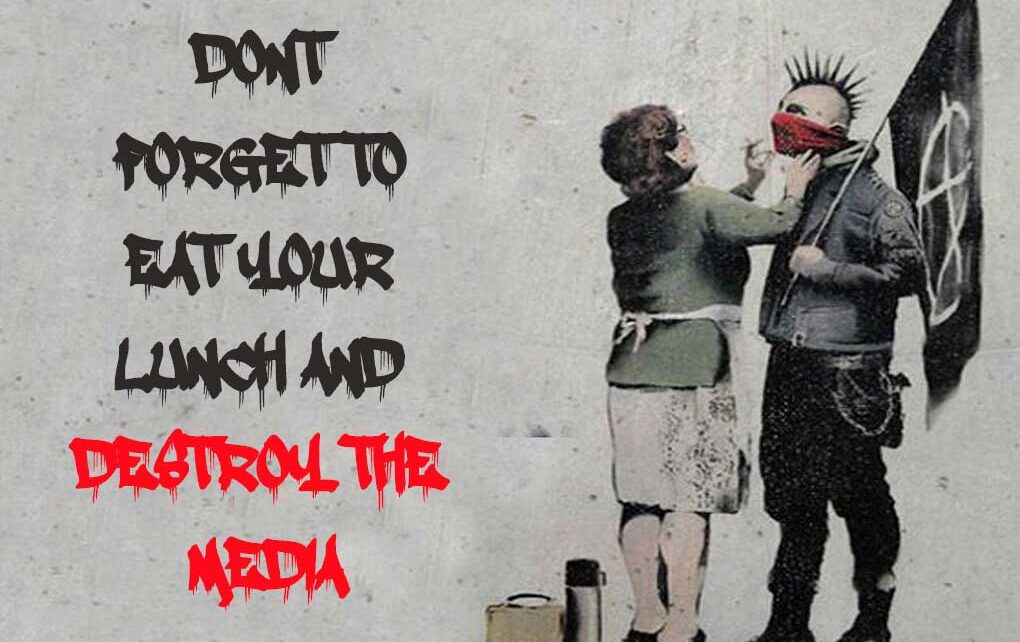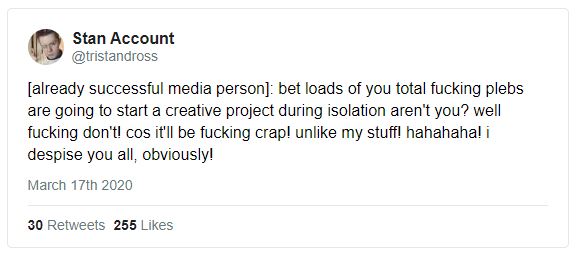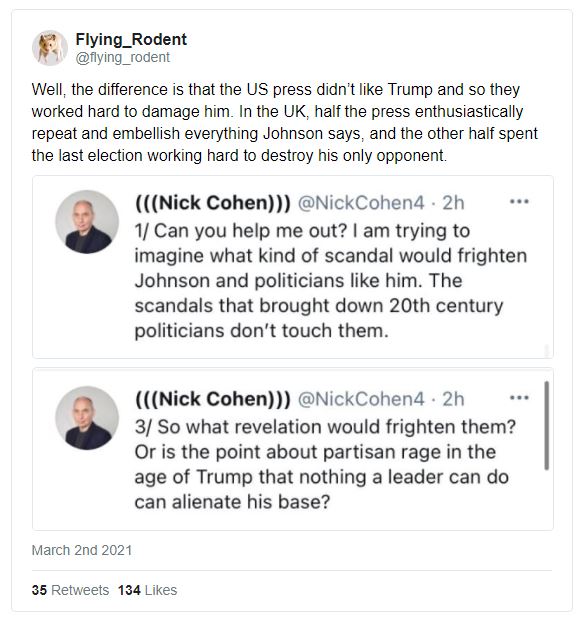This is a sentence. This is another. Now write a column: Why can’t the media fight corruption? Because it won’t cut its own deadwood!
We’re stuck with a prog press when we need a punk insurrection.

In 1977, Tony Moon produced a fanzine called Sideburns and, to fill space, scrawled out a drawing showing three guitar chords (A, E and G) and captioned: “This is a chord. This is another. This is a third. Now form a band.” Though it’s often credited to the more famous Sniffin’ Glue, Moon’s quickly created statement has become an enduring image of the DIY principle of Punk.
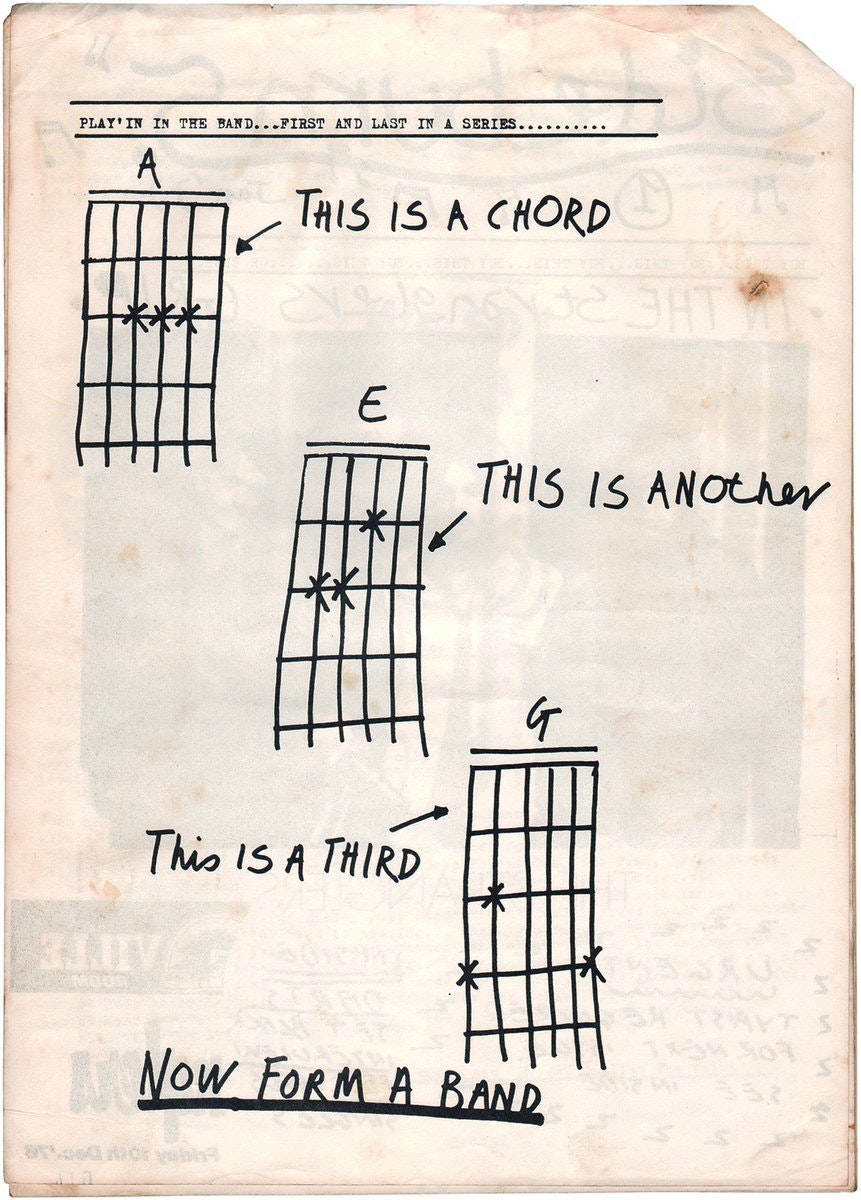
I think about Moon’s drawing a lot, especially when I see people who have jobs in the media sneer at things like ‘amateurs’ creating podcasts or making their own shows via Twitch streams.

In 2016, Jeremy Corbyn remarked, “There is a poem, a painting, a novel, a play in all of us”/ Helen Lewis, then at The New Statesman but now of The Atlantic, quoted his words on Twitter and replied: “DON’T ENCOURAGE THEM JEREMY.” It was an off-hand tweet but it’s stuck in the minds of many as a good example of how people who are allowed to express themselves for a living can tacitly or even explicitly attempt to prevent others from getting the same opportunities.
I see variants of the ‘don’t encourage them, Jeremy’ tweet on a daily basis, most often from people complaining that we don’t need any more podcasts, but increasingly newsletters and Twitch streams are being slotted in as the modes of expression that the plebs should leave to the experts. At the beginning of lockdown, it was establishment figures sneering at the idea of people using the change in circumstances to write a novel. Tristan Ross summed up their mindset:
My problem is never with there being too much creative expression. It’s with the narrow range of what is considered legitimate or valued. The same small set of voices get most of the attention and good faith critique. The rest are just written off. It’s led to a commentariat class in British media that has largely been in place for decades. The thinking in British newspapers is sclerotic and narrow.
No more than a handful of columnists under the age of 45 are allowed into the pages of the British press and yet newspaper journalists wonder aloud why young people don’t read them. To use a reference from many of the columnists’ childhoods, it’s because the music that they constantly play says nothing to young people about their lives. The coverage of youth culture, especially online culture, is almost uniformly fearful and sneering.
A lot of establishment voices love to wang on about how democratising punk was while working very hard to ensure, like the establishment of the time did, that nothing like that happens again. British newspapers are like what British music would have been like without the arrival of Punk and New Wave; almost all of the columnists cluttering up the place are the newspaper equivalent of self-indulgent prog-rockers noodling away for themselves and their friends, barely bothered about whether the audience is listening.
Two things led me down this line of thinking — a long and unhinged thread by a Professor at UCLA decrying Substack (the platform I used to send this newsletter) as an existential threat to journalism, and a tweet from the ‘veteran’ newspaper columnist Nick Cohen pondering why no scandal has taken Boris Johnson down.
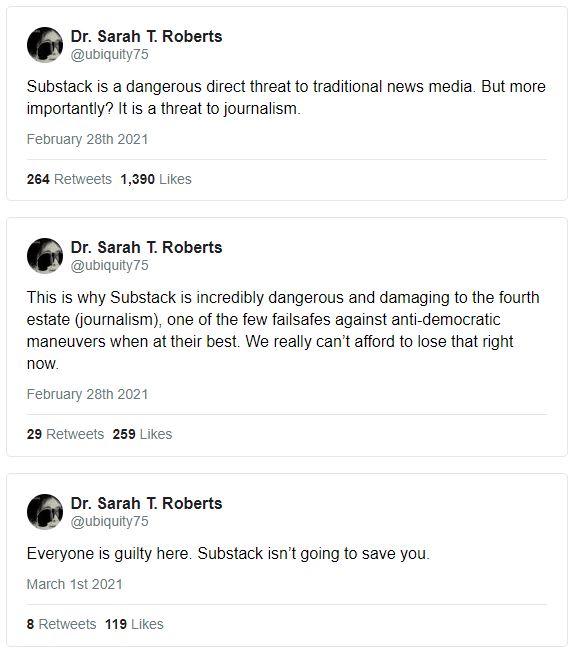
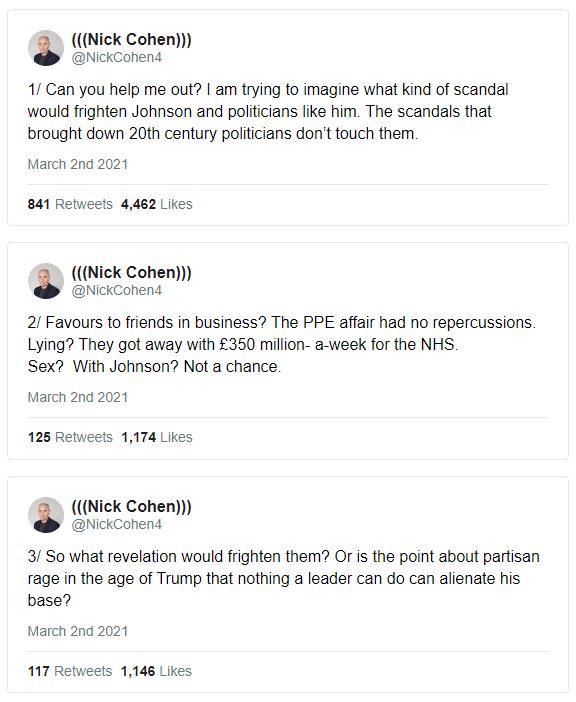
Dr Roberts’ thread, which is far longer than the three quotes I’ve tweeted, is built on a strawman — that people using the platform assume that it will “save journalism”. I don’t. It’s a venture capital-backed company that has made hooking payment processing up to an email list convenient. I’ve no doubt that I’ll have to move on from it at some point when the investors tighten the screws and make Substack’s founders do something stupid.
What’s killing journalism though is not Facebook, Twitter, Substack, WordPress or any other tech innovation. Yes, they’ve all contributed in one way or another (Facebook particularly) but the media spent many decades assuming that no alternative would come along, getting fat on advertising money and treating readers, viewers and listeners like a commodity.
That complacency and contempt is also at the root of why ‘scandals’ no longer bring down politicians in the UK and US. When Cohen wonders why Boris Johnson and his corrupt cabinet of cronies seem untouchable, he’s failing to look at our own industry. In vote after vote, whether party leadership contests, general elections, or the Brexit referendum, the majority of commentators in the press got it wrong. They’re still getting it wrong with their assessment of Keir Starmer and their analysis of the government.
On the right, columnists and commenters are willing to twist the way they see the world in an endlessly warping fairground mirror to justify the logical leaps and lies of their favourite politicians.
The centrists, meanwhile, have spent the years since Brexit and Trump pointing their fingers at anything bad and shouting, “The Russians! The Russians!” rather than seeing that the rot began long before and that what Russian interference there has been was effective only because the system was already broken.
The Left is either entirely excluded from the conversation or has its arguments treated as laughable until circumstances change and those ideas are seized by the right and rebranded. The centrists fight tooth and nail against any suggestion that the Left ever makes the correct call.
The obsession with complicated conspiracies rather than more commonplace grifts has made the media seem unbelievable. Even when it does uncover a scandal, politicians can shrug it off because newspapers and TV news squandered public trust in them. Many readers and viewers assume that everyone is lying and that every voice they hear has an agenda, hidden or otherwise. That the columnist class is so sclerotic doesn’t help.
There’s a familiar about the boomer generation believing they fought in wars that happened before they were even born; most British columnists believe that deep down and that they are fighting the Blair/Brown forever war of the mid-90s.
An injection of younger voices and of views from a broader range of political positions (no GB News, hiring more right-wing headbangers doesn’t count) could drag the British media back towards relevance and effectiveness. That won’t happen any time soon though; the residents of the roach motel are just too comfortable and well-paid to consider it.
We would like to introduce Mic Wright with this new piece on the Media
Click here to go straight to the original Blog and remember to sign up for his new material
